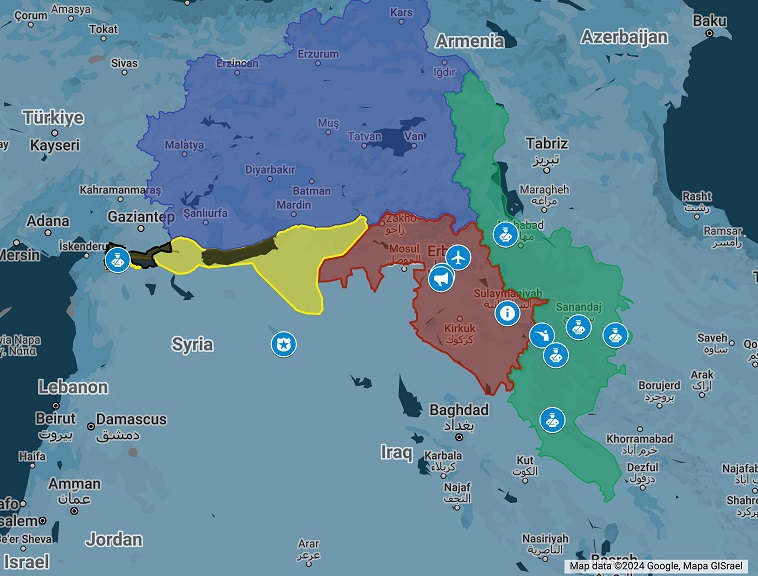1.4K
A weekly brief of events occurred in the Kurdistan regions of Iran, Iraq, Syria, and Turkey.
Iran
- Iranian authorities arrested dozens of civilians in the Kurdish region (Rojhelat), including ten Kurdish teens in Jwanro, for celebrating the Iranian soccer team’s loss in the Asian Cup. Public celebrations of national team defeats have been a common form of protest, especially when the U.S. team defeated Iran in the World Cup. According to the Hengaw Organization for Human Rights, additional detainees include an artist and two activists in Senna, two activists in Kamyaran, and six individuals in Marivan, Kamyaran, Dewalan, Qorveh, and Jwanro, who are accused of anti-government social media posts or activism. In North Khorasan province, the regime arrested four producers of a Kurdish song titled “Homeland.” Simultaneously, the Islamic Revolutionary Court sentenced three Kurds in Saqqez to lengthy prison terms ranging from two to three and a half years for commemorating the death of the Kurdish woman Zhina Amini. The same court in Naquadah and Ilam sentenced two Kurds to a year in prison for their membership in an opposition party and protesting against death sentences. Lastly, Iranian border guards wounded seven Kurdish border porters (kolbar) near Nowsud and Baneh last week amid an intensified crackdown on the borders.
Iraq
- The Association of Petroleum Industry in the Kurdistan Region (APIKUR) has reiterated its appeal to U.S. officials and Congress to exert pressure on Baghdad to lift the suspension of oil exports from Kurdistan. In a recent statement, APIKUR highlighted the significant impact of the halt on international oil markets, estimating a loss of $10 billion for investors. The association urged for a reconsideration of future assistance to Iraq, linking it to the government’s interference in preventing American companies from realizing their investments in the country. Despite assurances from Iraqi officials regarding the resumption of oil exports, no concrete progress has been achieved, resulting in a substantial financial setback of over ten billion dollars for both Iraq and the Kurdistan region. Simultaneously, the federal government has withheld Kurdistan’s budget share for the first three months of 2023, even though employee salaries for January have been disbursed. At the Munich Security Conference (MSC), Kurdistan Region’s President, Nichervan Barzani, held talks with Iraqi Prime Minister Mohammed Shia al Sudani. The spokesperson for the Kurdistan presidency reported “relative progress” in the discussions between Baghdad and Erbil following the meeting. In another development, the Iraqi parliament is set to amend the budget law next month amid the Kurdish push to fix their share in the new process. Meanwhile, Iraq’s Supreme Court has postponed a verdict for the eleventh time on an appeal regarding Kurdistan’s election laws filed by the Patriotic Union of Kurdistan (PUK). The election, scheduled for 2024, is yet to be given a date due to the ongoing legal case. However, a positive development emerged on Tuesday as a delegation from the Independent High Electoral Commission (IHEC) met with the KRG team at the presidency in the presence of the United Nations Mission to Iraq (UNAMI).
- Following the U.S. retaliation against Iranian-backed militias in Iraq and Syria, drone attacks have come to a halt. Sabrina Sigh, the Deputy spokesperson of the Defense Department, stated, “There has been no attack since February 4 in Iraq and Syria.
Syria
- The Syrian Democratic Forces (SFD) thwarted an attack by militias supported by the Assad regime in the Deir Ez Zor province. The SDF reported that a group of militants, backed by Assad’s security forces, attempted to infiltrate three towns: Diban, Shafa, and Kashma. This incident follows the recent killing of four SDF members by militias supported by Assad. Last week, the House of Representatives passed the Assad Regime Anti-Normalization Act with a significant majority of votes. The bill is awaiting approval in the Senate before being sent to the president for signature. Once enacted, the bill will prevent the normalization of U.S. relations with the Assad regime and extend the sanctions imposed on the regime until 2032.
- According to the Syrian Observatory for Human Rights (SOHR), Turkish forces were responsible for the death of two Syrians, including a child, along the Syrian-Turkey borders in 2024. Additionally, three Syrians were wounded, with reports indicating that a child among them was “beaten and tortured by Turkish border guards.” In occupied Afrin, Turkish-backed forces arrested a civilian Kurd and imposed new taxes on Syrians deported from Turkey. Furthermore, Turkish-backed factions continue to engage in the abduction of civilians, demanding ransom for their release, with two such cases reported last week.
Turkey
- The Peoples’ Equality and Democracy Party (DEM Party) has unveiled additional candidates for the upcoming local elections on March 31 across Turkey. In a rally held in Ankara, the party presented its election manifesto, pledging to advocate for “political, administrative, and financial autonomy in local governments.” Concomitantly, thousands of Kurds throughout Europe, with dozens in the U.S., gathered in support of the imprisoned Kurdish leader, Abdullah Ocalan. They called for an end to the isolation imposed on Ocalan by the Turkish government. Ocalan has been held in isolation on a Turkish island since 1999, with limited access to his defense team or family members.
- Falih Al-Fayyadh, the head of the Iranian-backed Popular Mobilization Units (PMU), arrived in Ankara and engaged in a meeting with Turkey’s Minister of Foreign Affairs, Hakan Fidan. The statement released by the Turkish government did not provide details about the meeting. Fidan had previously visited Baghdad in 2023 and maintained frequent communication with Sunni and Turkmen politicians, reflecting Turkey’s involvement in Iraq’s internal affairs. Notably, the U.S. has imposed sanctions on the Iraqi politician Al-Fayyadh since 2021 for charges related to human rights abuses.

